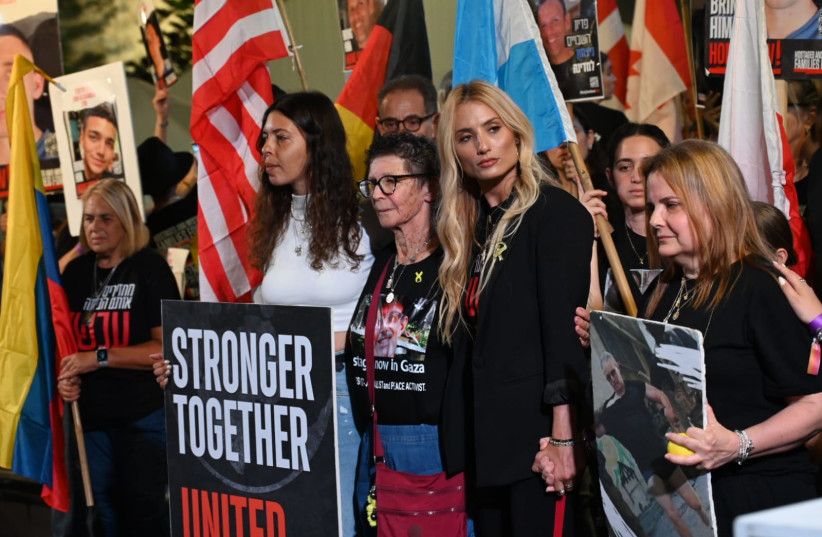Former hostage, UCLA encampment leader come together for debate in California
Former Hamas hostage, Moran Stella Yanai—who is half Egyptian and half Moroccan—spoke in a debate with UCLA encampment leader Aidan Doyle and Mosab Hassan Yousef, the son of Hamas co-founder Sheikh Hassan Yousef, in a video segment released on Monday by The Gr8 Debate.
Yanai began by saying she wanted to tell a story, if her co-speaker, Doyle, wanted to hear it, and invited him to visit her city of Beersheba. Doyle did not answer when asked if he had visited Israel or Gaza. She emphasized they do not have to hold the same opinions, but that it is important to understand the facts, and that her agenda of coexisting is to hear the others’ side.
“When I was taken to Gaza, I was kidnapped, I was caught three times,” said Yanai, adding that she was categorized as a soldier because of her army-style outfit that morning. “On the last time, I was caught by 13 Hamas terrorists.”
“When I was entering Gaza—and I told you before, I have Arab suppliers, I have Arab neighbors and Arab friends—there is a video I saw, 100% of civilians celebrating me being taken,” said Yanai, explaining she had a broken leg and bruises all over her body. “I didn’t know about the other hostages, I thought it was only me. My 12-year-old niece found out [on] a video on TikTok—that’s how my parents found out that I was kidnapped.”

Controversial questions from the audience answered
The moderator then accepted questions from the audience, including from a man who addressed Doyle, asking, “There’s an undeniable violent orthodoxy among your movement, in the encampment in particular, where anyone who advocates for the unconditional release of the hostages or the destruction of Hamas is physically attacked or blocked out of public spaces, so I’m grateful that you’re here for a relatively civilized conversation. How is your violent exclusionist antisemitic movement helping anything, and do you have a solution for the region and any ideas about the hostage crisis other than globalizing the intifada?”
“The encampment wasn’t antisemitic,” answered Doyle. “Jewish students were allowed to go to class, and on Wednesday when they came and it was taken down, there were hundreds of Jewish students there.”
“Students who were blocked from the encampment, it had nothing to do with their identity,” added Doyle, after shouts and contradictions from the audience. He said that people were removed from the encampment due to a fear of violence by agitators.
Another audience member posed a question to both Doyle and Yousef, asking, “How do you see this conflict ending, and why or why not is that resolution adequate in creating long-term peace and stability in the region?”
Doyle answered first, stating, “There needs to be a one-state solution with equal rights and protections for everybody, and a relatively equal distribution of the land for Jews, Muslims and Christians. That means that the government of Hamas, the Palestinian Authority, and the Israeli government, none of them are perfectly suitable to do this, but it would require a lot of cooperation.”
Yousef, who answered next, said there are about 12 Palestinian factions and all of them have a different idea of what Palestine is. “The problem is not only with Hamas, it looks like we have to please so many opposing forces,” he said. “We try to please Hamas, then we have a problem with the Islamic Jihad. If we please the Islamic Jihad, we have a problem with the public front.”
“You have been used by Hamas, they want you to cause chaos, they want the global chaos,” Yousef concluded. “They want to put pressure on the US government, on the Israeli government, and all other democracies. They want to bring the civilized world to its knees from those ugly images that we see from the war.” He also stated that before there can be a dialogue, the Palestinians need to decide what they want.
“What’s their constitution, what’s their agenda, what’s their leadership,” Yousef asked. “And will they drop violence as a method? Will they accept Israel’s right to exist?”
“As long as they want to annihilate the state of Israel, kill their own children, sacrifice civilians only for your sympathy and the rest of the world’s sympathy, then this cycle of violence will never end,” he concluded.
The debate was filmed at the University of California, Los Angeles, on June 16, 2024, and the first half of the video was released in July.





Comments are closed.